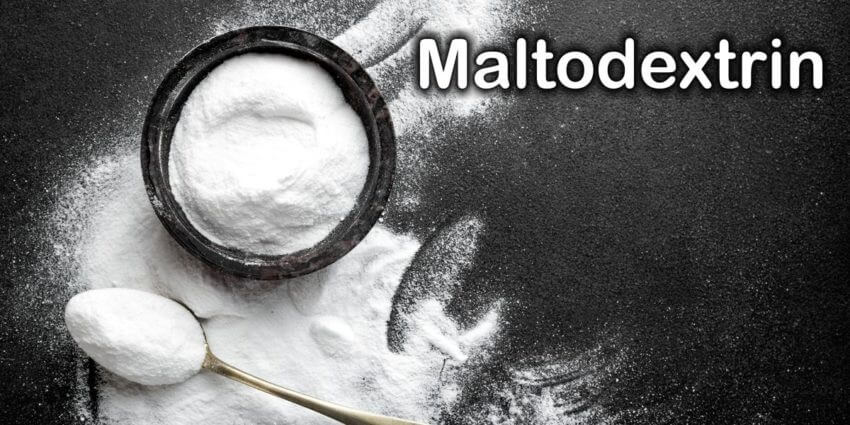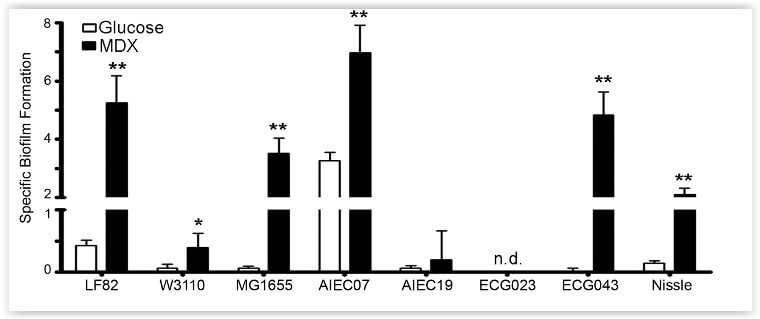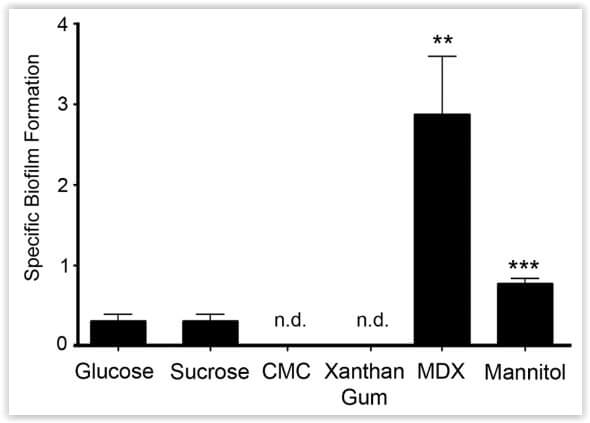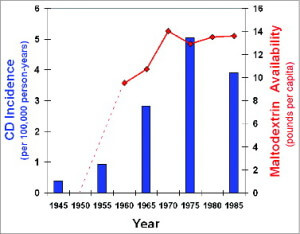What if you knew there was something in your food that feeds bad bacteria and promotes dysbiosis of your microbiome? An artificial substance often listed as “natural”, but really isn’t. One that provides you with no benefit. Wouldn’t you at least try to avoid it.
This isn’t a teaser, I’m not going to tell you it is carbohydrates or something. Oh wait, it is a type starch, but not a natural one.
Maltodextrin (MDX) is a man-made polysaccharide (a starch) made from corn or wheat; “The starch is cooked, and then acid and/or enzymes are used to break the starch into smaller polymers ” (1). The starch is not absorbable by yeasts, and some bacteria, but for some reason bad bacteria seem to love it, thus is has the ability to throw the microbiome balance out of whack. Not only do these pathogenic bacteria love it, including e.coli, but they also utilize it make biofilms, at a much higher rate than they do with other starches and sugars such as glucose. MDX also improves the adhesion ability of these pathogens to stick to the intestinal wall, separate from their biofilm enhancements.
“Polysaccharides added to food as emulsifiers, stabilizers or bulking agents have been linked to bacteria-associated intestinal disorders. It is often used as a bulking agent in foods, even in artificial sweeteners such as stevia. It can even be found in beer where it “improves the mouthfeel of the beer, increases head retention and reduces the dryness of the drink”. It is found in a great deal of processed foods.
The escalating consumption of polysaccharides in Western diets parallels an increased incidence of CD during the latter 20th century… Maltodextrin (MDX), a polysaccharide derived from starch hydrolysis, markedly enhanced LF82 specific biofilm formation. Biofilm formation of multiple other E. coli strains was also promoted by MDX…MDX also increased bacterial adhesion to human intestinal epithelial cell monolayers… MDX enhances E. coli adhesion and suggests a mechanism by which Western diets rich in specific polysaccharides may promote dysbiosis of gut microbes and contribute to disease susceptibility.” — PubMed #23251695
“mice consuming MDX-supplemented water had a breakdown of the anti-microbial mucous layer separating gut bacteria from the intestinal epithelium surface. Additionally, oral infection of these mice with Salmonella resulted in increased cecal bacterial loads. These findings indicate that consumption of processed foods containing the polysaccharide MDX contributes to suppression of intestinal anti-microbial defense mechanisms and may be an environmental priming factor for the development of chronic inflammatory disease. — PubMed #25000398
by McDonald C Nickerson KP, Department of Pathobiology, Lerner Research Institute, Cleveland Clinic, Cleveland, Ohio. — PLOS ONE
In the above graphic note how much more biofilm was produced (for each specific biofilm type) for Maltodextrin over glucose. In some cases many times more biofilm was produced on a diet supplemented with maltodextrin than on glucose. Maltodextrin also assists with bacteria adhesion to the intestinal wall (where glucose does not).
The above graphic shows the ability of these substances to raise overall biofilm levels, note Maltodextrin (MDX) ability far exceeds the other substances tested.
DOI: 10.1080/19490976.2015.1005477
Note how the incidence of bowel inflammation (Crohn’s Disease) has increased at the same rate as the availability of Maltodextrin.
“In the course of our studies, we uncovered disturbing parallels between the increasing dietary prevalence of MDX and a dramatic rise in CD incidence” — DOI: 10.1080/19490976.2015.1005477
“Since the mid-1950s, MDX has been added to foods as a filler, thickener, texturizer, or coating agent… We found in a survey of grocery store food items that ∼60% of all packaged items had “maltodextrin” or “modified (corn, wheat, etc.) starch” included in their ingredients list. Furthermore, results of a food frequency questionnaire indicated that 98.6% (210/213) of respondents routinely consume food items containing MDX, with an average consumption of 2.6 MDX-containing items per day…Consumption of MDX decreases the mucosal barrier of the intestine and increases the proximity of commensal bacteria to the epithelial layer.”
“The escalating consumption of polysaccharides in Western diets parallels an increased incidence of CD during the latter 20th century. In this study, the effect of a polysaccharide panel on adhesiveness of the CD-associated AIEC strain LF82 was analyzed to determine if these food additives promote disease-associated bacterial phenotypes. Maltodextrin (MDX), a polysaccharide derived from starch hydrolysis, markedly enhanced LF82 specific biofilm formation. Biofilm formation of multiple other E. coli strains was also promoted by MDX. MDX-induced E. coli biofilm formation was independent of polysaccharide chain length indicating a requirement for MDX metabolism.” — PLOS ONE
“During the latter 20th century, increased CD (Crohn’s Disease) incidence has been associated with consumption of polysaccharides in Western diets. AIEC LF82 specific biofilm formation was strongly favored in the presence of maltodextrin (MDX), a starch-derived polysaccharide [93]. MDX also promoted bacterial adhesion to human intestinal epithelial cells…As MDX is an ubiquitous dietary component, this suggests that Western diets, enriched in specific polysaccharides, may contribute to dysbiosis and lead to disease susceptibility.” — PubMed #PMC4279263
“we determined that the polysaccharide dietary additive, maltodextrin (MDX), impairs cellular anti-bacterial responses and suppresses intestinal anti-microbial defense mechanisms… Maltodextrin (MDX) is a Common Food Additive That Alters Both Microbial Phenotype and Host Anti-Bacterial Defenses.” — PubMed #25738413
“Modern human health is plagued by a number of complex, chronic inflammatory states associated with altered dynamics between host anti-microbial defenses and commensal microbes… we determined that the polysaccharide dietary additive, maltodextrin (MDX), impairs cellular anti-bacterial responses and suppresses intestinal anti-microbial defense mechanisms. In this addendum, we review potential mechanisms for dietary deregulation of intestinal homeostasis, postulate how dietary and genetic risk factors may combine to result in disease pathogenesis, and discuss these ideas in the context of recent findings related to dietary interventions for IBD.” — PubMed #PMC4615306
Maltodextrin also has one of the highest Glycemic Index values of any food or sweetener, 110 -150 depending on how it is processed and what charts you read. This is higher than even glucose, and more than twice that of table sugar.
Maltodextrin goes by other names too, such as “modified corn starch” and “Dextrin”. “Corn syrup solids” may be just as bad, it is the syrup form of maltodextrin (a powder). Both may have other names in countries other than the US.
So what can we do about this? Avoid boxed and processed foods as much as possible and read labels. If the label says anything about “maltodextrin” or “modified (corn, wheat, etc.) starch” it should be avoided.
(1) http://santostrading.com.au/articles/maltodextrin.html
All images posted by John Herron are either "Copyrighted John Herron", or are copyrighted by someone else and are used under license. So please don’t use them elsewhere, you’ll get in trouble.





 Phage Complete comes with a full 30 day money back guarantee, for U.S. purchases this includes the original shipping charges to you!
Phage Complete comes with a full 30 day money back guarantee, for U.S. purchases this includes the original shipping charges to you!
What about the small amount used in supplements?
If there are two supplements that are equal in other ways I’ll buy the one without the Maltodextrin. It may not help a great deal but I do think it helps a little (it all adds up). It also helps send a message to the manufacturers (maybe leave a comment on the page as to why you didn’t buy it).
Thanks for the quick reply John.
I consume around 50 grams of supplemental maltodextrin post workout with 20 grams protein . Depending on how hard I am training I’ll consume another 50 grams during or before training if my sessions go on for more than 90mins. I’m very lean . Should I use something else ? Carbohydrate is vital to performance.
At the same time I’m interested in gut health. I look pasty when mine is off and have a glow when it’s good . I try to consume 500g of pro biotic yoghurt with fruit daily
I read somewhere that athletes, pre/post workout, that use MDX may be able to burn much of it off before the microbes can get to it. But I can’t find that at the moment and I do remember it being a “may” and “much of”. Personally I would choose dextrose instead.
john,
I just finished reading your book. Thank you!…. My daughter started the elemental diet yesterday. The first ingredient in the Vivonex ingredient list is MDX!… I noted this before she started and she pointed it out to her doctor, who said not to worry. Is it okay in this case?.. Are there any supplements mentioned in your book that she should be taking concurrently with the elemental diet? I couldn’t find anything about this in your book.
Cynthia,
MDX is used as a carbohydrate source, not a good choice in my opinion. Ask your doctor if there are other formulations that do not contain MDX. As noted in the article it can be a problem by promoting the growth of bad bacteria. I would think that few doctors know this information, you may want to print it out for your doctor. Depending on what is wrong with your daughter the doctor may determine that MDX is worth the risk, especially if taken for a limited time.
What about rice MDX?
I’m afraid it is still maltodextrin and has the same problems. I’ve a label that said “Maltodextrin (from GMO corn)”, but Maltodextrin is
not
a natural product. It can be made from rice, corn, potatoes and wheat (even in gluten free products without specifying the source! It is allowed to have a very small amount of gluten). I forgot to mention that maltodextrin can also be found in beer as it gives it a “better tongue feel”.
Maltodextrin causes my body to inflame. Does anyone else have this problem?
Yes, absolutely. Watery, burning eyes, cough, dizziness, nausea, bowel issues, head-to-toe stiffness and inflammation.
Yes, I’ve only just realised it’s in the dextrose tablets I’ve been using if I’m hypoglycemic (I have T1 diabetes). I don’t seem to be able to repair the damage. Trying aloe vera juice, probiotics, juice therapy but still having issues. I would welcome help on how to repair my gut!
@ Jill – I grew up with the most debilitating seasonal allergies, and did a lot of research as to the causes. I was able to reduce the symptoms almost entirely by avoiding dairy, BUT it would still flare up sometimes, and recently I noticed it was because of this Maltodextrin. I remembered an article I read many many years ago (I wish I remembered where I read it), that said that Apple Cider Vinegar will flush the poisonous sweeteners out of the body. I tried it and it worked!!! I tried it on multiple occasions, and with multiple different chemical sweeteners, and it still worked!! Yesterday my allergies flared up pretty badly again, I drank several glasses of water with about a Tablespoon of ACV in each glass, and woke up this morning feeling 99% better! Luckily ACV also helps reduce and heal from Diabetes, according to the Bragg book on ACV. I hope you get to try it!
Yes me too! any joint of mine that vulnerable to pain is gonna hurt when I consume that stuff. I have IBS and its definitely a trigger ingredient, oddly enough it relieves my constipation but the stomach pains aren’t worth it.
Yes, I suffered SEVERE seasonal allergies, and after doing research, gave up milk, and the allergies went away for several years. Recently the allergies would come back, sometimes severe, even though I stay away from dairy. I was able to pinpoint it to Maltodextrin in food. I remembered many years ago reading an article (I wish I remembered where, it was such a long time ago) that said if you want to detox artificial sweeteners (they were talking about aspartame, but I’m sure it applies to Maltodextrin), you can drink Apple Cider Vinegar and it would detox and flush out the bad artificial sweeteners out of your body. I tried it when I consumed a drink that had aspartame and it worked!! And I tried it more recently when I had consumed something that I was not aware that it had Maltodextrin, and it worked again! So now I’m convinced that Apple Cider Vinegar helps flush out the fake sweeteners and chemicals. Try it!!
HOW can we get the FDA to STOP listing maltodextrin as ORGANIC? It’s made from a whole food before processing and that’s about it. Even if we could get them to list it as GMO, then we can be sure non-GMO products aren’t using it, generally. Additionally, research articles state that maltodextrin intolerance (I’ve had very severe maltodextrin intolerance since 2005) is found more in individuals with IBS/IBD. Irritable Bowel is a fairly common condition these days. I would think the food industry might recognize this and see that maltodextrin is not an additive which is going to be beneficial. It’s a huge, very lucrative industry which I assume also is financially beneficial to food manufacturers. A majority of MDX is imported from China and India and 3rd world countries (which also worries me). As well as the FDA, the AMA and physicians MUST be educated. My GI docs don’t even believe in problems from it. This is a very scary issue, IMVHO. Nice article. Thanks for posting it.
Malodextrim is in food, listed twice, that is cooked and delivered. I’m on the Passport/ waiver program. I need a lot of help. 14 meals in plastic containers sealed that can go in microwave (I don’t use) . i mostly throw them out, taste bad and doesn’t seem like read food. My chronic illnesses are worse and can barely walk now. Other suspicious ingredients: texturixed vegtable portion in meat, more preservatives…
Add me to the long list of MDX intolerance. It’s been going on for years and I could never figure it out, despite elimination diets. I would always “reward” myself with a cup or two of tea or decaf coffee with 2 packets of Equal, Stevia, or Splenda–all of which have a maltodextrin base. The coconut, oat, and almond milks I was using had maltodextrini!
Doctors could find no reason for my chronic aches, pains, watery eyes, coughing, dizziness, nausea, bowel issues, inflamed colon, weird bowel disorders, and high yeast fecal counts.
Purely by accident on an elimination diet day I ingested nothing but herbal teas and rotated with sweeteners and faux milks. Still, bad symptoms. Reading labels, I discovered the common denominator was maltodextrin. The next day I removed it from my diet and within 24 hours all symptoms (except for dull flank pain from still-inflamed colon) were gone.
I can’t believe something so minor and insignificant could have an impact on my overall health!
.
I see an Herbalist, I use Stevia Tincture. But I Only am given 1oz. @ a time. So I buy the Stevia Powder for baking, sweetening drinks etc. Today I read the Label; Maltodextrin. I had Gastric Bypass In 2001; no one told me about the inflammatory issues of Artificial Sweeteners. I thought Stevia was going to be a good alternative, is it possible to get it without any additives? I do have itchy eyes, skin and a cough when I used The Powder.
Faith,
I use a pure Stevia product from BulkSupplements (ordered on Amazon), no additives at all.
Yes me too, just organic raw Stevia powder and nothing else.
That’s all that I use.